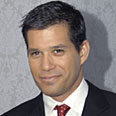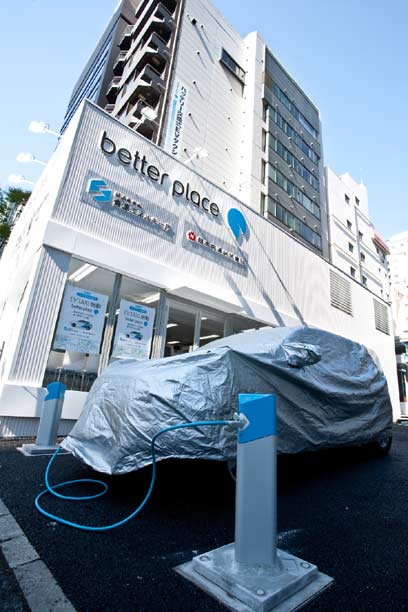
Better Place tests electric taxis in Japan
Global provider of electric vehicle services launches Tokyo battery-switching station to serve city's largest taxi company. 'We chose Japan to awaken Japanese automobile industry, to show them it is possible,' says company's Israeli CEO Shai Agassi
TOKYO - Better Place launched its first battery-switching station in Japan on Monday, which will serve Tokyo's largest taxi operator Nihou Kotsu. The company will operate four electric taxis on a test run for the Japanese government. The trial will last for a period of three months, and, if it proves successful, may lead to the expansion of the use of electric taxis in Tokyo, as is the case in other cities in Japan and around the world.
"I believe this project will be very effective in reducing carbon dioxide emissions, and will therefore contribute to the fight against global warming," said Sakihito Ozawa, Japan's environment minister on Monday.
"For the sake of creating a viable society, I very much hope this project is a success," he added.
"Today is a historic turning point in the journey which we began some two-and-a-half years ago," said Better Place CEO Shai Agassi, "When we chose Japan, we did so to awaken the Japanese automobile industry, so that they may see that what we have 'on paper' is the real thing.

Taxis responsible for 20% of air pollution
"The new battery-switching station has 12 batteries at any given moment, which can serve a fleet of 200 taxis," Kiyotaka Fujii, head of Better Place in Japan told Ynet. "The choice of taxis for the trial was very natural. There are some 60,000 taxis in Tokyo, which make up some 2% of the total fleet of automobiles, but emit 20% of the carbon dioxide that comes from transportation. Therefore, converting the fleet of taxis to run on electricity carries with it a great environmental advantage."
According to Fujii, funding for the battery-switching station came fully from the Japanese government. "Government involvement is very much needed to expand the use of electric vehicles. It will speed up their development, encourage buyers, and assist in the necessary infrastructure development," he said.
He added that the model that Better Place and the Japanese government are testing could easily be copied to other cities around the world.
During the Tokyo test run, all aspects related to the operation of an electric car will be tested, including the distance of a journey, the influence multiple charges have on the lifespan of a battery, and the vehicles' convenience.
Better Place sources said that a wide-scale test will be held in Israel after the Tokyo experiment, and will include charging stations and battery-switching stations.
It should be noted that a number of electric car tests have been conducted around the world in the past two years. For example, BMW leased some 100 electric Minis in New York for a year-long trial. During the test period a number of problems were revealed, including shorter ranged than planned by the manufacturer, as a result of the cold weather in the winter.
The reporter is a guest of Better Place in Japan










